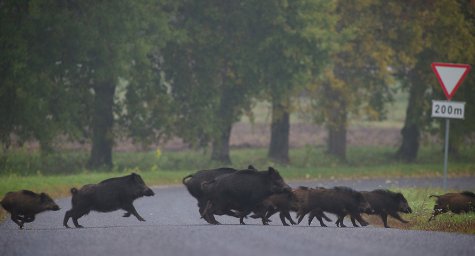Wild boars getting ready for winter
Text Vahur Sepp, forester
Photo Sven Zacek, www.zacekfoto.ee
Translation Liis
Make way!
Wild boar Metssiga Sus scrofa
The wild boars are preparing for winter. A fat layer has formed under the skin and internal organs have become covered by reserve fat. The change of fur is ending. The summer coat of sparse bristles that even left the belly bare in places has been replaced by a winter coat with a dense undercoat. The piglets increasingly resemble the adult animals, but they are smaller, rounder, with a shorter snout and with bristles tinged in russet red. The stripes have disappeared. The piglets weigh up to 30 kilos in favourable circumstances.
The autumn weather favoured farmers. There are no unharvested corn and potato fields. The boars have moved from cultivated areas to forests. The greater part of food consists of what hunters offered. Since the ground is still unfrozen, wild rhizomes, tubers and roots are easily accessible. Under the grass turf and debris layer there is plenty of animal food. This year the hazelnut harvest was quite good locally. What is left by nutcrackers, squirrels and mice becomes goodies for the boars.
Last autumn there was a deluge of acorns. The boar stuffed themselves to the limit but there were still some left. Boars from nearby and far away gathered around oaks, and in oak stands, holes up to half a metre deep or even more dug by boars could be found in winter. With their keen sense of smell the boars had searched out the stores hidden by rodents (water voles, voles). A basketful or even more of acorns made up for the digging effort. This year there are no acorns. The acorn crop in Estonia’s forests failed: there was not enough even for the jays. But they are not grieving. There will always be something else that helps to survive severe periods.









